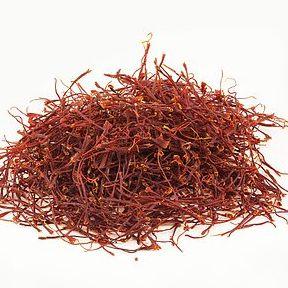The “superfood” craze is premised upon the dubious notion that some foods are so great, that eating them will bring good health and long life. For Popeye, spinach was a superfood. After gleefully swallowing a can full of the stuff, he grew big muscles and beat up Bluto.
The trouble with superfoods is that they aren’t real. That isn’t to say that some foods aren’t healthier than others; fruits and vegetables are better for you than potato chips and soda. But the notion that some foods are the secret elixir to youth or the magic cure for disease is hype.
Keeping that in mind, it is still worth investigating how food affects our bodies. Research in this area provides insights into our metabolism and physiology, which can tell us more about disease and how to prevent it.
Crocetin: Saffron’s Anti-Cancer Component
New research from a team of scientists based mostly in Italy suggests that saffron -- a spice used in some Asian, Indian, and Mediterranean dishes -- may have an intrinsic ability to fight cancer. Specifically, they examined a component of the spice called crocetin, which they synthesized in their laboratory.
The team found that crocetin could block the proliferation of two types of human cancer (cervical carcinoma and lung carcinoma) cells in a test tube, but it did not inhibit the growth of normal lung cells.
The mechanism of action seems to involve inhibiting an enzyme that is particularly active in cancer cells. By its very nature, cancer cells are hungry for energy and raw materials. To satisfy this need, cancer cells hijack a metabolic process that our cells use when the oxygen supply is low.
During intense exercise, for instance, muscle cells consume more oxygen than the bloodstream can provide. To produce energy under these anaerobic (“oxygen-free”) conditions, muscle cells produce energy through fermentation, which produces lactic acid (“lactate”).
Cancer, too, can switch over to produce lactate. Unlike muscle cells, however, cancer will generate lactate even if oxygen is plentiful. Worse, they use the lactate as a precursor to synthesize biomolecules for making more cancer cells. This hijacking of our fermentative metabolic pathway is known as the Warburg effect.
There might be an Achilles’ heel. An enzyme, called lactate dehydrogenase, is necessary to produce lactate. This enzyme is over-active in cancer cells, and the authors showed that crocetin can inhibit it. That’s why crocetin blocked cancer cells from growing. (It should be noted, though, that some synthetic inhibitors of this enzyme are far more effective than crocetin.)
So, You’re Saying Saffron Is a Superfood?
No. Lots of different molecules kill cancer in a test tube. Just because a compound shows promise in vitro does not mean it will have any measurable impact in humans. Indeed, a mountain of evidence – including plausible biological mechanisms – suggests that antioxidants should obliterate cancer. However, antioxidants have consistently failed clinical trials.
Thus, there is a long way to go before saffron can be declared as anything more than an expensive spice. The next step would be to test saffron in clinical trials to see if people who take it have any noticeable health benefits. Additionally, it should be determined if there is any good reason for people to take saffron (or crocetin) as opposed to a more effective synthetic drug.
Barring that, it still may be worth incorporating some saffron into your meals, just in case it provides a small health boost. If it doesn’t, at least it tastes good.
Source: Carlotta Granchi, et al. “Characterization of the Saffron Derivative Crocetin as an Inhibitor of Human Lactate Dehydrogenase 5 in the Antiglycolytic Approach against Cancer.” J Agric Food Chem 65 (28): 5639-5649. Published: 23-Jun-2017. DOI: 10.1021/acs.jafc.7b01668




